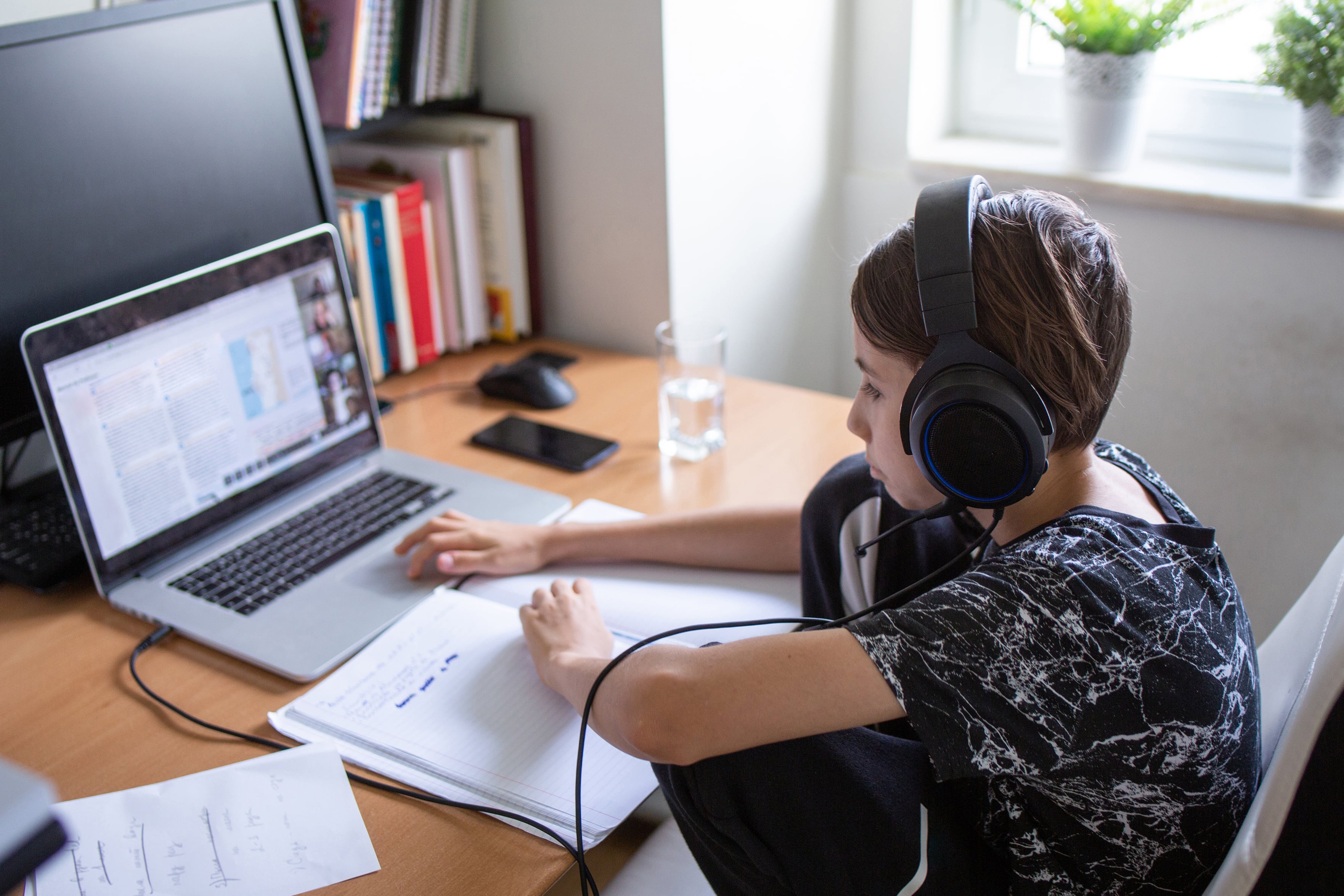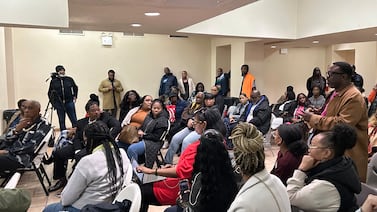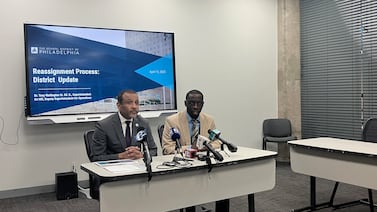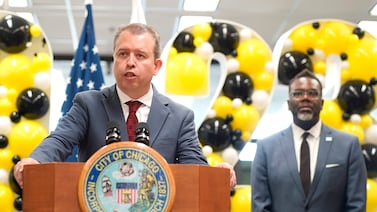Sign up for Chalkbeat Philadelphia’s free newsletter to keep up with news on the city’s public school system.
Student lesson plans built and personalized by artificial intelligence. Just two hours of classes daily. Frog dissections, defusing bombs, and ascents of Mount Everest — all in virtual reality. And teachers who transform from traditional instructors into “guides.”
That’s the vision MacKenzie Price has for a new cyber charter school in Pennsylvania. In Price’s telling, her AI-powered model turbo-charges students’ academic performance so much that they — and their guides — are free to spurn traditional classes for several hours of the school day and pursue other enriching activities instead. The tech entrepreneur says her program will revolutionize education, and she says she has the numbers to back it up.
But several other states have reviewed her pitch and rejected it. She’s already had to clarify perhaps her most startling claim about whether her schools really employ traditional teachers; in Pennsylvania at least, they would. Critics say what she’s selling is based on selective data from expensive private schools. And they’re deeply skeptical that the core teaching method holds up to scrutiny.
While schools nationwide are trying to incorporate AI-powered instruction into the classic teacher-in-front-of-the-classroom format, Price wants to blow that format up and put AI in the lesson-planning driver’s seat. It’s perhaps no surprise she’s zeroed in on Pennsylvania — it’s become the cyber charter capital of the nation, with 60,000 students enrolled full time in cyber charters in 2023-24. Yet the schools’ often lackluster academic track record and other concerns have led to calls for more accountability and pressure on Gov. Josh Shapiro to place a moratorium on new cybers.
Price told Chalkbeat she’s determined to expand, and she thinks Pennsylvania could be the key. “I want this to impact millions of students,” she said.
The backbone of Price’s schools is 2 Hour Learning — a model she co-founded that relies on a mix of proprietary AI tutoring software and third-party apps like Khan Academy, IXL, and Amplify. She also co-founded the Alpha School in 2014, a group of affiliated private schools which are built around 2 Hour Learning. The platform is also used at several other specialized schools Price is associated with that serve gifted and talented students, students pursuing sports, and refugees.
In fact, Price has sought to start not one but two charter schools in Pennsylvania. By the end of the month, the Pennsylvania Department of Education is slated to decide on whether to give Price’s plan for a cyber charter, Unbound Academy, the green light.
Recent news might not augur well for that application: On Tuesday evening, the Lancaster school district administration advised their school board to reject a proposal to open a brick-and-mortar charter school called Valenta Academy that would use 2 Hour Learning.
The school board is scheduled to vote on the school’s application “at a later date” according to a spokesperson. (Valenta Academy is also operating as a private microschool in Bastrop, Texas.)
Can AI-powered learning ‘help everybody’?
Both Unbound and Valenta would run on the 2 Hour Learning model, although it’s Price’s cyber charter school that’s drawing a lot of the attention.
According to the school’s Pennsylvania application, Unbound Academy would launch in the fall of 2025 with 500 students in grades 4-8 and only four teachers. By its fifth year, Unbound plans to enroll 2,500 students and 76 teachers. And the application projects a 90% student retention rate each year — much higher than other cyber charters have projected in their applications.
In year two, Unbound Academy projects it’ll be ranked in the top half of all Pennsylvania schools, according to the application.
Price said with AI driving each student’s learning, all lessons will fit individual needs. A fifth grader who struggles with reading but excels in math may receive AI instruction for reading at a fourth grade level but 25 minutes later may be doing pre-algebra work. That’s something traditional grade-level schools aren’t set up to do for every student, she said.
“I really believe that this method of educating people is something that can help everybody,” Price said.
As her model has drawn national attention, Price has changed her tune when it comes to perhaps her most dramatic claim.
“We have removed the teacher from the front of the classroom. No one has ever dared to do this before,” reads a promotional booklet on 2 Hour Learning. “Imagine starting a school and declaring, ‘We won’t have any academic teachers.’ We did exactly that!”
But Price acknowledged that what the school does is not quite “exactly that.”
“We have teachers. Teachers are critical to any education system,” Price said. “What we are doing is transforming that role of teachers so that we can allow them to focus on doing what they really do best, which is being able to positively impact students and build connections with them and provide motivation.”
Indeed, the application for Unbound Academy says candidates for the “guide” role must have a bachelor’s degree and hold a valid Pennsylvania teaching certificate to adhere to state teacher certification requirements.
Nevertheless, Price’s model is getting an icy reception in some quarters.
“Just as we do not accept students using AI software to write their essays or complete homework assignments for them, we will not accept districts using AI to supplant the critical role of teachers, specialists, and support staff in the classroom,” said Arthur Steinberg, who’s president of both the Philadelphia Federation of Teachers and the American Federation of Teachers’ Pennsylvania affiliate. “There are far too many examples of AI products failing badly for states to do anything less than exercise extreme prudence when considering new AI-based models and schemes.”
AI-powered school makes big test score claims
Unbound’s application repeatedly cites results from the Alpha private schools showing their students not only learn content “twice as fast” as their peers, but can also rapidly learn any grade-level content they may be behind on.
To support this claim, Price points to scores from MAP, a suite of standardized assessments from NWEA. She said that on average, students in the 2 Hour Learning model “experience 2.4 times the academic growth compared to their peers in traditional education settings.”
Alpha schools also promote remarkable numbers, saying for example that its students rank in the 99th percentile of academic performance. Alpha’s website notes that it relies on the Pomodoro technique for time management, a reference to using a kitchen timer to increase productivity.
“The results that I’ve been able to get from our schools have been absolutely phenomenal,” Price said.
Her work doesn’t stop with American students. The 2 Hour Learning Model has been used in a virtual setting by Ukrainian refugees, Price said, and those students are also demonstrating accelerated learning. But those results are not public.
Reactions by other states to Price’s educational model have been mixed.
Late last year, Arizona — where the policy landscape is very receptive to disparate schooling models — approved an application from Unbound Academy. But Arkansas, North Carolina, and Utah have rejected it. Price said she also has an Unbound application pending in South Carolina.
Officials from the North Carolina Charter School Review Board shared several questions and concerns about the school, according to the meeting minutes from their review of Unbound’s application last September.
One official, Alex Quigley, said that Price had made a “compelling” case, and that Unbound’s model could be piloted in schools before scaling up. Yet he also noted that at least one of the Alpha Schools charges $40,000 a year for tuition. While Alpha schools in Texas and Miami do charge thousands for tuition, Price said many of the students at Alpha’s Brownsville, Texas location come from challenging socioeconomic backgrounds and attend on scholarship.
Another North Carolina official, Bruce Friend, said he “wasn’t clear about the role of the teacher compared to the role of AI and the parent.” Board officials also expressed worries about whether the school could meet the mandated academic calendar, student accessibility, and whether it was appropriate for young students to do a “massive” amount of learning online.
Then there’s skepticism about using in-person private school test results to project success with a cyber charter school.
Cyber charter operators in Pennsylvania have told Chalkbeat their students’ test scores “can’t and shouldn’t be compared to brick-and-mortar school scores.” Cyber charter students frequently move in and out of virtual learning environments. Many may be dealing with bullying, mental health issues, family instability, or physical health constraints. In short: They’re different from typical tuition-paying private school students.
Yet Price said she’s undaunted by the differences between students at Alpha schools and those who may enroll in a cyber charter school in Pennsylvania. She believes her 2 Hour Learning technique can work for anyone and can work in traditional public schools too.
“The great news about public charters is we’ve got to report our results. We’ve got to be able to show how we do on standardized tests compared to other students in Pennsylvania,” Price said. “So the proof is going to be in the pudding.”
Many cyber charter teachers ‘struggle to help students’
But supporters of traditional public schools say there’s too much uncertainty embedded in Price’s proposals.
Unbound’s cyber model is unproven and “does not have a track record,” said Carol Burris, executive director of the Network for Public Education, a group that is critical of charter schools.
Burris also said she was struck by the large number of Unbound cyber charter applications despite the group only having experience with brick-and-mortar private schools.
“I have never seen this phenomenon before,” Burris said of a group pursuing so many different types of schools at the same time.
Susan Spicka, executive director of the Education Voters PA advocacy group, said she rejected Price’s idea that the day-to-day work of being a classroom teacher is something that can be minimized by or subordinated to AI.
“There are a lot of very highly qualified, excellent teachers in Pennsylvania who teach at cyber charter schools, and they struggle to help students succeed when they are sitting at home on a computer in the online environment,” Spicka said. “It’s hard for kids to learn at home. The level of frustration my kids felt with stuff like that when they were forced to do it [during COVID] was off the charts. They hated it.”
Spicka also questioned how Price’s model serves students with disabilities if there’s no classroom teacher assigned to monitor them while they learn.
Unbound’s application says the school will adhere to the Individuals with Disabilities Education Act and “will offer a variety of special education programs and related services, delivered both directly by specialized staff and through contracts with external providers” via “in-person visits” or online teletherapy sessions.
For English language learners, “adaptive online programs like Duolingo” will be incorporated into their lessons and parents will have access to translated documents and “real-time interpretations during virtual sessions.”
Regardless, Spicka and others are lobbying for more scrutiny on cyber charters.
For example, they’re looking for lawmakers and Shapiro to add more funding and staff to the state education department so it can increase Pennsylvania’s monitoring of cyber charter schools.
State Sen. Lindsey Williams, a Democrat, has promised to introduce legislation for a moratorium on all new cyber charters until the state is better able to monitor the ones currently in operation.
In a December memo to her colleagues in the state Senate, Williams pointed to research showing the schools “consistently under-perform both brick and mortar charters and district schools,” and “every one of Pennsylvania’s cyber charter schools has been identified as needing some level of support and improvement under the state’s accountability system.”
Williams wrote that it’s not surprising that private operators like Price “perceive our state as ripe for profiteering off of Pennsylvania’s children and taxpayers and apply to open new cyber charter schools.”
As for Price, she’s already thinking bigger than Pennsylvania.
She said if the Trump administration “called me up and said, ‘what would you do if you were in charge of K-12 education’?” she’d tell them to embrace “personalized learning technology” — like 2 Hour Learning.
Carly Sitrin is the bureau chief for Chalkbeat Philadelphia. Contact Carly at csitrin@chalkbeat.org.







